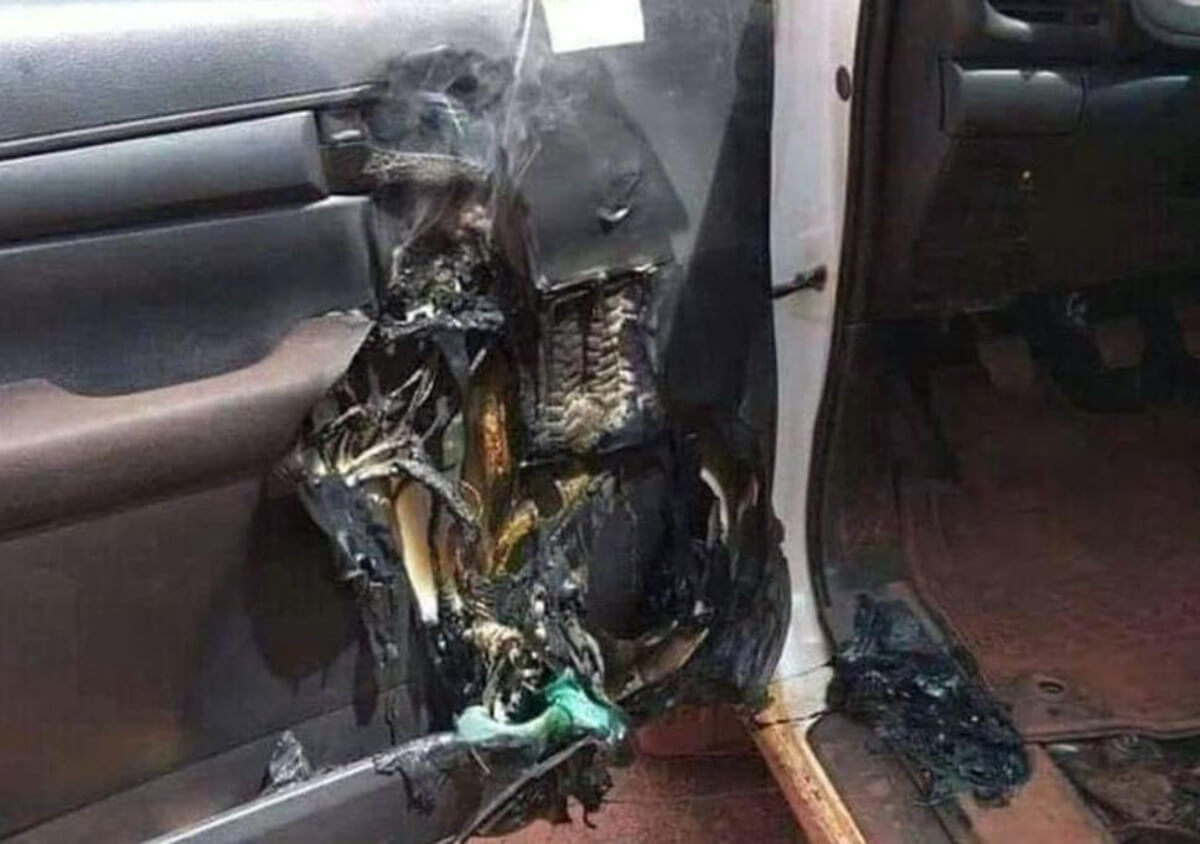
This photo, shared by the Western Lakes Fire District in Oconomowoc, shows the aftermath of a car fire involving hand sanitizer. The district claimed sanitizer could spontaneously combust if left in a hot car, but that is not true; the damage in the photo was caused by an existing fire that consumed a bottle of sanitizer. (Photo via Facebook/Western Lakes Fire District)
Provided you keep your car out of volcanoes, metal foundries, and the sun, you have nothing to worry about.
You might have seen that Facebook post going around from the Western Lakes Fire District in Oconomowoc — the one that claims alcohol-based hand sanitizer could spontaneously combust if left in a hot car.
“By its nature, hand sanitizer is essentially alcohol and therefore flammable,” the district wrote. “Keeping it in your car during hot weather, exposing it to sun, and being next to open flame such as grills can lead to disaster.”
The post, acommpanied by a photo of a scorched car door, went viral from there. The New York Post ran with it. So did The Independent, and local news sources across the country. It was just another log on the dumpster fire that 2020 has been: Now it’s dangerous to keep sanitizer in your car to guard against coronavirus?
But the claim is simply not true, according to Guy Colonna, director of engineering and senior principal engineer with the National Fire Protection Agency.
For alcohol-based sanitizer to spontaneously combust, Colonna said, the temperature in a car would need to reach 700 degrees Fahrenheit — something that will never happen, no matter where you live. And if your car interior does reach that temperature, you might have other issues than a bottle of hand sanitizer catching fire.
“If the sun was playing directly on the plastic container, it is still not going to be able to generate temperatures of 700 degrees,” Colonna said. “…If I park it in a volcano, more likely the issue there is I’ve got open flames.”
Alcohol-based hand sanitizer does evaporate quickly, with a relatively low flashpoint at just 60 to 70 degrees, and those vapors are highly flammable, Colonna said. But the vapors would still need an ignition source, and the air would need to be saturated at about 2 percent alcohol vapor for combustion to occur, he said.
Even if you were to give off static electricity or light a cigarette after getting in the car, the simple act of opening the door to get in would dilute the vapors and allow them to escape, Colonna said.
The biggest risk you take by leaving some Purell in your car is that the alcohol can evaporate and make the sanitizer less effective, Colonna said.
For its part, the Western Lakes Fire District edited its post to remove the false information, but it also claimed people misunderstood the intention of the original post.
“Our message quickly became misconstrued and we wanted to assure that we made it right,” the post now reads. The statement came after a lengthy clarification in which the district said it was only trying to guard against people exposing sanitizer to open flames.
So what about the photo that the Western Lakes Fire District shared of the aftermath of sanitizer bursting into flames? The bottle was just exposed to an open flame, according to Colonna.
“It had nothing to do with exposure to a hot car or exposure to sun,” Colonna said. “They basically took pieces (such as the low flashpoint and flammability of the vapors) and everybody was running with all those pieces.”
Politics

Opinion: The problem with Youngkin’s Charter-Lab schools push in 2024
The Problem Governor Glenn Youngkin introduced 233 amendments to the bipartisan budget so it was hard to know how to assess his budget–for example,...

What to know about Trump’s legal issues
Over the past year, former president Donald Trump has become the center of not one, not two, not three, but four criminal investigations, at both...
Local News

Virginia verses: Celebrating 5 poetic icons for National Poetry Month
There’s no shortage of great writers when it comes to our commonwealth. From the haunting verses of Edgar Allan Poe, who found solace in Richmond's...

Join the fun: Recapping Family Literacy Night’s storybook adventures
When’s the last time you read a book aloud with a loved one? If it’s difficult to answer that question, then maybe it’s time to dust off that TBR...




